

Les plans de Facebook pour conquérir le monde. Facebook prévoit de partager automatiquement vos données avec de. Live Blog: Mark Zuckerberg's F8 Keynote. Facebook is hosting its annual f8 developer conference in San Francisco today.
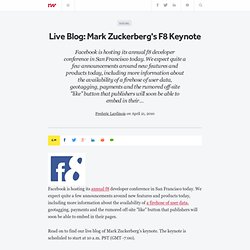
We expect quite a few announcements around new features and products today, including more information about the availability of a firehose of user data, geotagging, payments and the rumored off-site "like" button that publishers will soon be able to embed in their pages. Read on to find our live blog of Mark Zuckerberg's keynote. The keynote is scheduled to start at 10 a.m. PST (GMT -7:00). Watch it Live You can also find live video of the keynote here.
We will refresh this page regularly during the keynote. 9:45: Audience is getting seated. 10:01: Looks like there is a little delay. 10:07: Rumor: Facebook and Microsoft will announce a new application partnership. Image credit: Devin Reams. 10:11: Zuckerberg on stage. Is the New Facebook a Deal With the Devil? Facebook blew people's minds today at its F8 developer conference but one sentiment that keeps coming up is: this is scary.
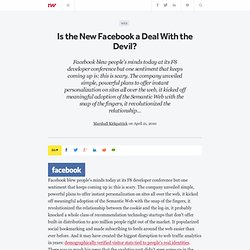
The company unveiled simple, powerful plans to offer instant personalization on sites all over the web, it kicked off meaningful adoption of the Semantic Web with the snap of the fingers, it revolutionized the relationship between the cookie and the log-in, it probably knocked a whole class of recommendation technology startups that don't offer built-in distribution to 400 million people right out of the market. It popularized social bookmarking and made subscribing to feeds around the web easier than ever before. And it may have created the biggest disruption to web traffic analytics in years: demographically verified visitor stats tied to people's real identities. There was so much big news that the analytics part didn't even come up in the keynote. We won't go into all the details in this post. Facebook Consolidates Its Virtual Currency with Facebook Credits. One of the many announcements at Facebook's f8 conference today included an expansion of the Facebook Credits program, the social network's official virtual currency.
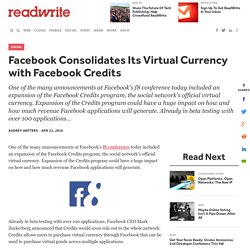
Expansion of the Credits program could have a huge impact on how and how much revenue Facebook applications will generate. Already in beta testing with over 100 applications, Facebook CEO Mark Zuckerberg announced that Credits would soon role out to the whole network. Credits allows users to purchase virtual currency through Facebook that can be used to purchase virtual goods across multiple applications.
Credits are meant to simplify online transactions by allowing users to use just one source of currency, rather than having to enter separate bank or credit card information for every purchase. Liu also introduced the App2user Credits program, promotions that will allow users to earn Facebook credit without paying with their credit cards. Facebook: What They Announced At F8. It’s been a busy day at F8, Facebook’s third developer conference, and there is much to talk about.
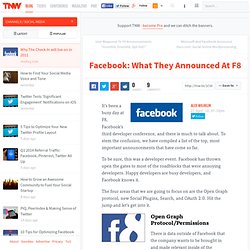
To stem the confusion, we have compiled a list of the top, most important announcements that have come so far. To be sure, this was a developer event. Facebook has thrown open the gates to most of the roadblocks that were annoying developers. Happy developers are busy developers, and Facebook knows it. The four areas that we are going to focus on are the Open Graph protocol, new Social Plugins, Search, and OAuth 2.0. Open Graph Protocol/Permissions. Médias & Publicité : Facebook étend son emprise sur. Plusieurs annonces sont attendues ce mercredi lors de la conférence de développeurs organisée par le réseau social, qui est en train de créer un index parallèle de l'Internet grâce à ses utilisateurs.
Sans avoir l'air d'y toucher, Facebook est en train de mettre le Web sous sa coupe. Le bouton «like» pourrait changer Internet. Lors de la conférence F8 de Facebook mercredi 21 avril, le PDG Mark Zuckerberg a dévoilé la nouvelle phase de la stratégie de conquête du web de l'entreprise: une initiative pour que les utilisateurs Facebook se connectent sur des sites de la Toile entière.
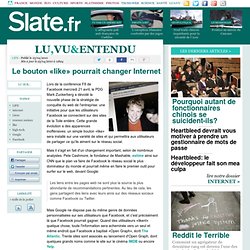
Cette grande évolution a des apparences inoffensives: un simple bouton «like» sera installé sur une variété de sites et qui permettra aux utilisateurs de partager ce qu'ils aiment sur le réseau social. Mais il s'agit en fait d'un changement important, selon de nombreux analystes. How Facebook won the web. Mashable's Pete Cashmore says Facebook's new "Like" button lets the site deliver a more personal experience to users.
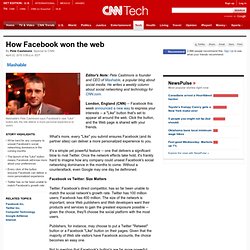
It'll be hard for any company to unseat Facebook's social networking dominance in the coming months The launch of the "Like" button means Facebook will know more about your preferences Every click of the button ensures Facebook can deliver a more personalized experience Twitter has so far been unable to match Facebook's growth rate Editor's Note: Pete Cashmore is founder and CEO of Mashable, a popular blog about social media. He writes a weekly column about social networking and technology for CNN.com. London, England (CNN) -- Facebook this week announced a new way to express your interests -- a "Like" button that's set to appear all around the web. Click the button, and the Web page is shared with your friends. How Facebook's Newest Feature Could Change the Internet - Busine. Did Facebook just conquer the Web?
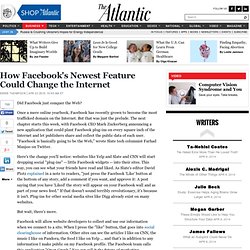
Once a mere online yearbook, Facebook has recently grown to become the most trafficked domain on the Internet. But that was just the prelude. The next chapter starts this week, with Facebook CEO Mark Zuckerberg announcing a new application that could plant Facebook plug-ins on every square inch of the Internet and let publishers share and collect the public data of each user. "Facebook is basically going to be the Web," wrote Slate tech columnist Farhad Manjoo on Twitter.
Alex Hervaud: Pendant le discours de Zuc... Facebook veut convertir son audience en profits.